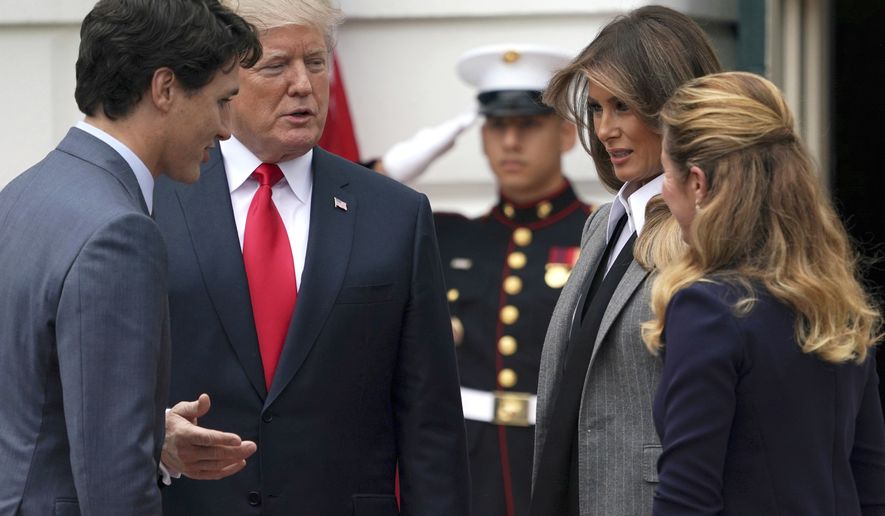President Trump hosted Canadian Prime Minister Justin Trudeau at the White House to discuss the fate of the North American Free Trade Agreement Wednesday, with Mr. Trump pushing for what he called “fairness” for U.S. workers as a critical round of talks began.
“We’ll see if we can do the kind of changes that we need,” Mr. Trump told reporters at the White House. “We have to protect our workers, and in all fairness the prime minister wants to protect his people also. We have a tough negotiation.”
With negotiators holding a fourth round of talks near Washington, the U.S. is seeking several major changes to NAFTA, including to a rule governing the origin of car parts to avoid import taxes that could be difficult for Canada and Mexico to accept.
Mr. Trump raised the possibility he would consider a separate U.S.-Canada trade deal if he follows through on his campaign pledge to terminate NAFTA, leaving Mexico on the outside.
Mr. Trudeau, under pressure at home to maintain good ties with the country’s largest trading partner, took the diplomatic route in public, telling reporters in the Oval Office the U.S. and Canadian “have a good partnership and there are always ways to improve it.” He plans to visit Mexico City after his stop in Washington.
Mr. Trump said Canada shouldn’t fear an end to NAFTA.
“I think Justin understands this, if we can’t make a deal, it will be terminated and that will be fine,” the president said. “I think it is going to work out very well for both countries.”
The warm words between the two leaders belied the tensions in the negotiations. Mr. Trump’s hardline stance is encountering renewed resistance not only from Mexico and Canada but from domestic industry groups, including the U.S. Chamber of Commerce and farm-state interests.
Chamber CEO Thomas Donohue has pledged to fight “like hell” to defend NAFTA if Mr. Trump tries to pull out.
“We’ve been patient, cool-headed and constructive,” Mr. Donohue said Tuesday in Mexico City. “But let me be forceful and direct: There are several poison pill proposals still on the table that could doom the entire deal.”
The Chamber objects to a “sunset clause” Mr. Trump is seeking that would automatically terminate the deal in five years without a new endorsement from all sides; a rule requiring a larger percentage of automobiles to be made in the U.S.; and a “buy American” rule limiting the size of government contracts for Canadian and Mexican firms.
Mexican officials are also adopting increasingly tough rhetoric as the odds have risen that NAFTA could be in trouble.
“We have to be prepared to say no, and if necessary to get up from the table and if necessary leave the treaty,” Mexican Foreign Relations Secretary Luis Videgaray said Tuesday. “It would not be the end of the world.” Economy Secretary Ildefonso Guajardo said the trade dispute may could affect bilateral cooperation on immigration and other issues.
“Clearly, Mexico’s willingness to collaborate would not be as enthusiastic if you are mistreated on one front,” he told Mexican reporters this week. “There would no doubt be the necessary cooperation for our own interests, but there wouldn’t be any volunteering of support for things that go beyond what our own national security requires.”
If Mr. Trump does decide to withdraw, there would be a mandatory six-month waiting period. It’s not clear what would happen after that.
Mr. Trudeau also came to discuss the Trump administration’s recent decision to hit Canadian manufacturer Bombardier with high tariffs on its C-series airliner. Chicago-based Boeing has accused Bombardier of receiving unfair subsidies from Canada and Great Britain.
The prime minister met earlier Wednesday with House Ways and Means Committee Chairman Kevin Brady, Texas Republican, who said the panel is committed to “successful” negotiations.
“When North America wins, America wins and the American people win as well,” Mr. Brady said.
But Mr. Brady also said that a revised NAFTA must address the digital economy and intellectual property rights, and boost market access for U.S. dairy producers.
The prime minister reminded lawmakers of the importance of the U.S.-Canada trade relationship.
“The U.S. sells more to Canada than it does to China, Japan and the U.K. — combined,” Mr. Trudeau told the committee. “We are already your biggest customer.”
• This article is based in part on wire service reports.
• Dave Boyer can be reached at dboyer@washingtontimes.com.




Please read our comment policy before commenting.